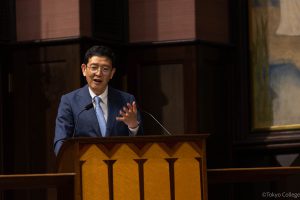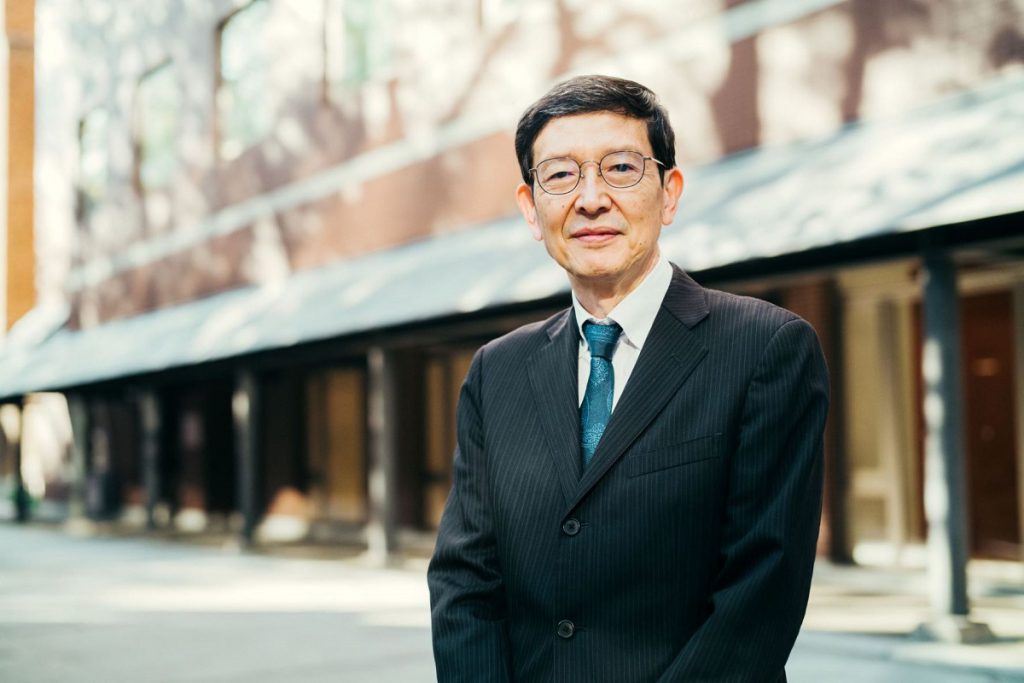I specialize in the theory of international political economy, studying the decision-making processes of economic policy, in particular the decision-making process behind trade policy and the interaction between security and the economy. The inauguration of the Trump administration has sparked changes that cannot be adequately addressed using conventional theories, and, in such an environment, my goal is to seek out new theories and identify policy implications for solving the issues at hand. The opportunity to interact with a diverse set of students at GraSPP is something that provides me with discoveries and, every day, I rediscover the enjoyment of teaching.
I specialize in the theory of international political economy, studying the decision-making processes of economic policy, in particular the decision-making process behind trade policy and the interaction between security and the economy.
I finished graduate school in the 1980s, a time when the paramount international concern for Japan was trade friction with the United States. It was this state of affairs that led me along the path of research, based on a desire to elucidate an academic solution. In the end, the trade friction between the United States and Japan settled quite suddenly, and although this outcome caused me to question my raison d’etre given that I had concentrated on finding a solution to the issues at hand, I reasoned that my research could be put to use when considering new problems in the future. The rise of China has since become a new research topic, and my goal is always to analyze contemporary issues and identify implications that can lead to improvement.

Serving as a moderator at the Tokyo College on July 12, 2022
2016 saw two significant events: the decision by the U.K. electorate to leave the EU and the election of Donald Trump. Particularly since the inauguration of the Trump administration, there has been a tendency to see the economy itself as part of security, making it increasingly difficult to engage in research on security and the economy separately. I analyzed the rise and fall of the global economy in the post-war period in Whither Economic Hegemony? The Era of Sino-American Parity and the Guideposts for Japan, and prior to the Trump Administration I published my research outcomes in 2017 in Japan’s Security and Economic Dependence on China and the United States: Cool Politics, Lukewarm Economics. However, due to the dramatic changes in the global situation, the logic that undergirded those findings is no longer applicable. I am now seeking a new theory to understand this situation, taking a different approach than populism. I would also like to study the escalating trade war between the United States and China to gain new insights. In economics as a whole, little progress has been made on research on countries other than the United States, perhaps because of regional biases within the information that is available.
Since its inception, GraSPP has maintained the consistent position that policies cannot be created by laws alone, and its mission has been to provide a wide range of learning opportunities, as well as to cultivate human resources and equip them with comprehensive knowledge to contribute to Japanese public policy. In recent years, in addition to this mission, we have taken on a new mission as a pioneer of internationalization within the University of Tokyo. By incorporating various programs, such as the Master of Public Policy, International Program, and the CAMPUS Asia Program, I feel that we have achieved dynamic progress in internationalization in a short time. We remain committed to maintaining and improving the quality of our learning environment, even as it becomes more internationalized and larger in scale.
Regardless of the country of origin of the students, the participation of professionals who bring their practical understanding and perspectives to the classroom helps to make discussions more concrete, broadens and deepens thought processes, and also stimulates graduates fresh out of college. Coming to GraSPP to engage in discussions about better public policy with a diverse group of students is surely a valuable experience that would be difficult to gain in the world beyond academia.
Education is not simply a one-way street; it is something that involves interaction. As a place that brings together the most promising and talented students, GraSPP is, for me too, an institution rich in opportunities for enlightenment and illumination and somewhere I enjoy teaching every day.
(I specialize in the theory of international political economy, studying the decision-making processes of economic policy, in particular the decision-making process behind trade policy and the interaction between security and the economy. The inauguration of the Trump administration has sparked changes that cannot be adequately addressed using conventional theories, and, in such an environment, my goal is to seek out new theories and identify policy implications for solving the issues at hand. The opportunity to interact with a diverse set of students at GraSPP is something that provides me with discoveries and, every day, I rediscover the enjoyment of teaching.
I specialize in the theory of international political economy, studying the decision-making processes of economic policy, in particular the decision-making process behind trade policy and the interaction between security and the economy.
I finished graduate school in the 1980s, a time when the paramount international concern for Japan was trade friction with the United States. It was this state of affairs that led me along the path of research, based on a desire to elucidate an academic solution. In the end, the trade friction between the United States and Japan settled quite suddenly, and although this outcome caused me to question my raison d’etre given that I had concentrated on finding a solution to the issues at hand, I reasoned that my research could be put to use when considering new problems in the future. The rise of China has since become a new research topic, and my goal is always to analyze contemporary issues and identify implications that can lead to improvement.
2016 saw two significant events: the decision by the U.K. electorate to leave the EU and the election of Donald Trump. Particularly since the inauguration of the Trump administration, there has been a tendency to see the economy itself as part of security, making it increasingly difficult to engage in research on security and the economy separately. I analyzed the rise and fall of the global economy in the post-war period in Whither Economic Hegemony? The Era of Sino-American Parity and the Guideposts for Japan, and prior to the Trump Administration I published my research outcomes in 2017 in Japan’s Security and Economic Dependence on China and the United States: Cool Politics, Lukewarm Economics. However, due to the dramatic changes in the global situation, the logic that undergirded those findings is no longer applicable. I am now seeking a new theory to understand this situation, taking a different approach than populism. I would also like to study the escalating trade war between the United States and China to gain new insights. In economics as a whole, little progress has been made on research on countries other than the United States, perhaps because of regional biases within the information that is available.
Since its inception, GraSPP has maintained the consistent position that policies cannot be created by laws alone, and its mission has been to provide a wide range of learning opportunities, as well as to cultivate human resources and equip them with comprehensive knowledge to contribute to Japanese public policy. In recent years, in addition to this mission, we have taken on a new mission as a pioneer of internationalization within the University of Tokyo. By incorporating various programs, such as the Master of Public Policy, International Program, and the CAMPUS Asia Program, I feel that we have achieved dynamic progress in internationalization in a short time. We remain committed to maintaining and improving the quality of our learning environment, even as it becomes more internationalized and larger in scale.
Regardless of the country of origin of the students, the participation of professionals who bring their practical understanding and perspectives to the classroom helps to make discussions more concrete, broadens and deepens thought processes, and also stimulates graduates fresh out of college. Coming to GraSPP to engage in discussions about better public policy with a diverse group of students is surely a valuable experience that would be difficult to gain in the world beyond academia.
Education is not simply a one-way street; it is something that involves interaction. As a place that brings together the most promising and talented students, GraSPP is, for me too, an institution rich in opportunities for enlightenment and illumination and somewhere I enjoy teaching every day.
(Article based on July 2020 interview)



